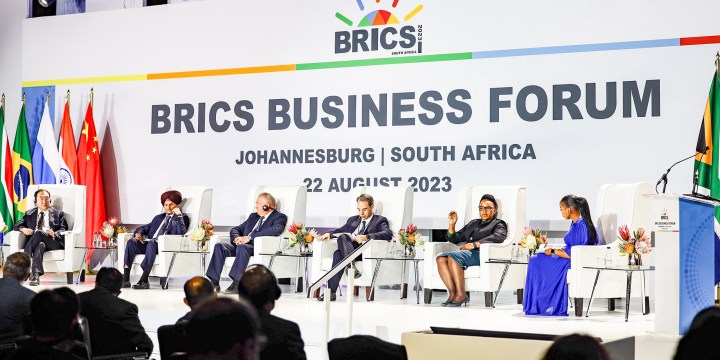SUMMIT IN SA
SA business leaders call for BRICS nations to boost trade with rest of Africa

Members of BRICS — mainly China and Russia — have come under fire for only engaging with African countries when providing them with aid and extracting from their economies without sustainably building them.
Business leaders Patrice Motsepe (founder and chair of JSE-listed African Rainbow) and Stavros Nicolaou (an executive at Aspen Pharmacare) have called on the BRICS countries to boost their trading activity with each other and African countries.
They believe that the formation of BRICS has benefitted all its member countries, especially South Africa.
The BRICS economies accounted for about 21.3% of South Africa’s total trade with the world in 2022, of which China accounted for 67.6%, India 26.5%, Brazil 4.2% and Russia 1.7%, according to data from the Industrial Development Corporation. South Africa’s overall trade with its BRICS partners increased by an average of 10% from 2017 to 2021.
While Motsepe and Nicolaou believe these trade numbers are good, there is room to grow them to include the rest of Africa, they argued during panel discussions at the BRICS Summit in Johannesburg on Tuesday, 22 August. There was a broader call for the BRICS member countries, in their policies of trade, to engage with other African countries to explore trading opportunities.
Leaders of the BRICS countries — South Africa’s President Cyril Ramaphosa, China’s President Xi Jinping, Brazil’s Luiz Inácio Lula da Silva, India’s Prime Minister Narendra Modi and Russian President Vladimir Putin — are likely to consider the inputs of business executives when they chart policies that outline the next growth vectors for their bloc.
Motsepe called for the BRICS countries, in their trading activities, to engage with and include the African Continental Free Trade Agreement (AfCFTA). The AfCFTA aims to create the world’s largest free trade area for goods and services, bringing together 55 African Union members and eight regional economic communities. In other words, the AfCFTA aims to boost trade among African countries by ensuring that trade barriers across the continent are reduced. Among the trade barriers to be reduced or relaxed under AfCFTA are import/export tariffs among the members.
Although the AfCFTA came into effect in January 2021, Motsepe believes that it is not being implemented or rolled out with “extreme urgency” by African governments. He said the BRICS nations must engage with countries that have embraced AfCFTA in an attempt to boost their trade with countries in the rest of Africa.
“At the heart of it has to be mutual benefit. About South Africa and the African continent, we have to position ourselves as a country and continent that produces goods that the BRICS countries would want. You can’t have a relationship based on aid, philanthropy and donations,” Motsepe said.
Members of BRICS — mainly China and Russia — have come under fire for only engaging with African countries when providing them with aid and extracting from their economies without sustainably building them.
“The future of African business and governments on the continent depends on the capacity to prove to the world that we can build partnerships and have relationships that are mutually beneficial,” said Motsepe, who was the inaugural chair of the BRICS Business Council, South Africa chapter, in 2013.
Nicolaou believes that South Africa, as part of the BRICS bloc, should find a way to boost trade with other countries in Africa.
“We [South Africa] are the second-biggest economy in the continent [after Nigeria]. South Africa remains the most industrialised and with the most advanced financial services industry.
“As much as we lament the infrastructure problems and supply chain problems in the country, we are addressing them through reform measures,” Nicolaou said. He added that South Africa, through its economic muscle and membership in BRICS, should push for increased trade with the rest of Africa.
South Africa is accustomed to recording trade deficits, meaning that the country is importing more goods and services than it is exporting. It recorded a trade deficit of R3.54-billion in June 2023, compared to a downwardly revised R9.57-billion surplus in the previous month.
“The most important thing is, how do we turn the deficit into opportunities for our businesses in South Africa and link them into the African continent through increased trade?” Nicolaou asked. DM

















Comments - Please login in order to comment.